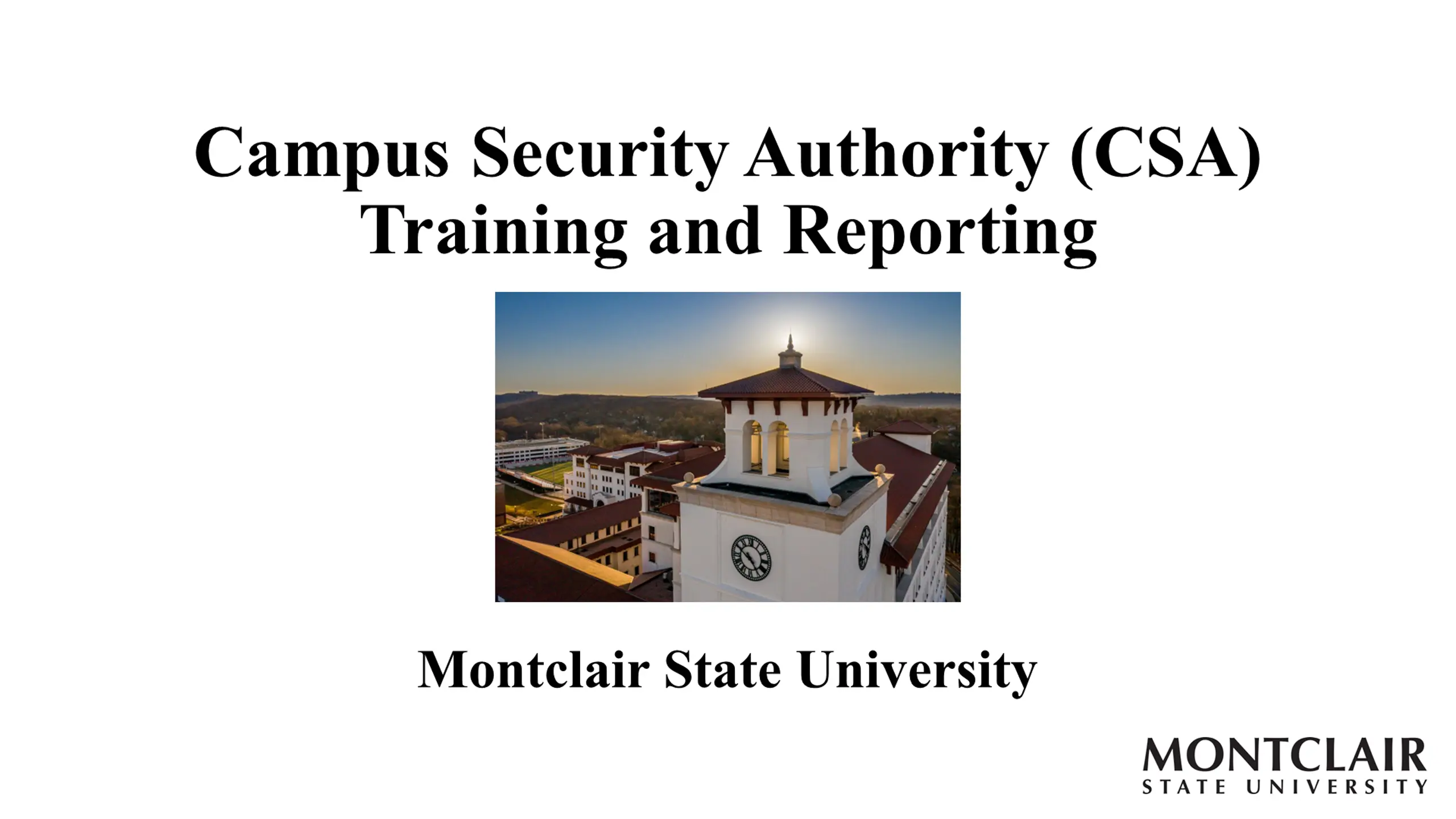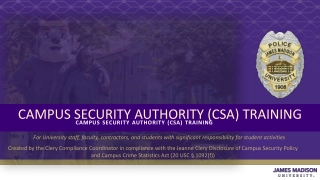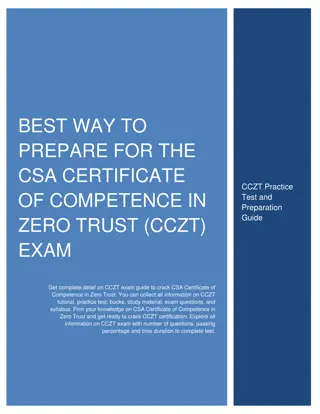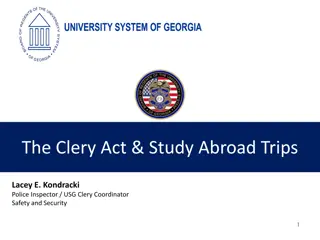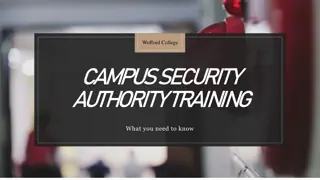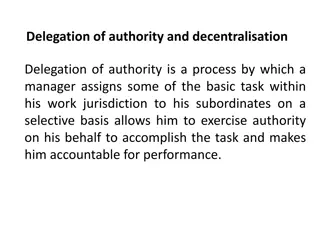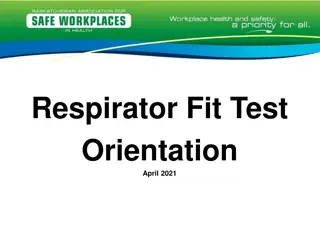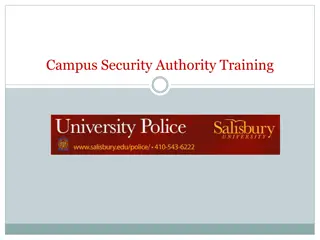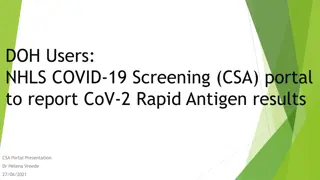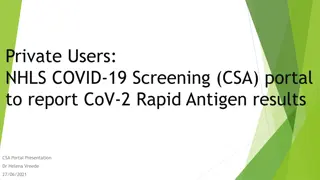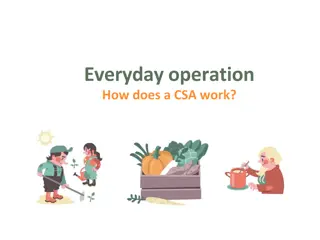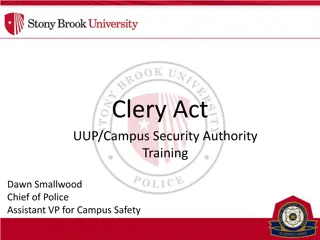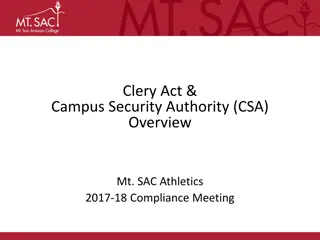Campus Security Authority (CSA) Training and Reporting
Understand Clery Act & responsibilities as a CSA for reporting crimes. Learn about Clery Act crimes, reporting procedures, and intersection with Title IX.
Download Presentation

Please find below an Image/Link to download the presentation.
The content on the website is provided AS IS for your information and personal use only. It may not be sold, licensed, or shared on other websites without obtaining consent from the author.If you encounter any issues during the download, it is possible that the publisher has removed the file from their server.
You are allowed to download the files provided on this website for personal or commercial use, subject to the condition that they are used lawfully. All files are the property of their respective owners.
The content on the website is provided AS IS for your information and personal use only. It may not be sold, licensed, or shared on other websites without obtaining consent from the author.
E N D
Presentation Transcript
Campus Security Authority (CSA) Training and Reporting Montclair State University
Goal and Objective Increase your understanding of the Clery Act and your roles and responsibilities as a Campus Security Authority (CSA) in reporting Clery Act crimes. You will be able to carry out your responsibilities as a CSA to report, in good faith, allegations of Clery Act crimes to campus police
Overview What is the Clery Act? Who is a Campus Security Authority? What are the responsibilities of a CSA? Who is included and exempt from reporting? Which crimes should you report? How do you report Clery Act crimes? How does the CleryAct and Title IX intersect?
Jeanne Clery Disclosure of Campus Security Policy & Crime Statistics Act Jeanne Clery was raped and murdered in her dorm room at Lehigh University in 1986. Her killer was another student. Her parents believe she would have been more cautious if she had known about other violent crimes at Lehigh. Her parents advocated for legislation that would require universities to disclose information regarding crime on college campuses.
What is the Clery Act? Federal law that requires institutions of higher education in the United States to disclose campus security information including crime statistics for the campus and surrounding areas. All public and private postsecondary institutions participating in federal student aid are subject to the law. Violators can be fined by the Department of Education for violating the law and risk loss of federal aid.
Who is a Campus Security Authority (CSA)? Campus Police Departments Individuals with Campus Security Responsibilities Individuals Designated by the Campus Officials with Significant Responsibility for Student and Campus Activities who are likely to receive complaints from a victim of crime. CSAs are defined and identified by their function, not by their title.
Category 1 Campus Police Departments All Officers of the Montclair State University Police Department.
Category 2 Individuals with Campus Security Responsibilities Persons responsible for monitoring or controlling entrance to campus property Campus safety personnel & community assistants who routinely monitor entrances to buildings and secured areas are likely to assist with reporting crime. Parking / Information kiosk staff Building managers Resident Assistants
Category 3 Individuals Designated by the Campus President s Office and Staff Student Affairs Director, Deans and Administrators Residence Life Staff, Residence Hall Directors Title IX Coordinator Others as designated
Category 4 Officials with Significant Responsibility for Student & Campus Activities Focus on Function of official, not just title Significant Contact with Students Line Responsibility May include Officials not specifically employed as Faculty or Staff
CSAs with significant responsibility for Student and Campus Activities Examples Include: Deans of Students Provost and Staff Representatives of Housing and Resident Life Student Judicial Programs / Other Discipline Officials Directors or Managers of student related programs Officials who oversee extracurricular activities Director of Athletics, Coaches, Trainers, Staff Student Health Directors Faculty Advisors and Advisors to Student Groups
Some examples of those exempt are Faculty with no responsibility for student activities beyond the classroom Individual campus health center physicians Clerical staff Food service staff Non-professional and contract staff
YOU DO NOT HAVE TO REPORT IF You are a licensed mental health counselor or a pastoral counselor (employed by a religious organization to provide confidential counseling) AND You are working within the scope of your license or religious assignment at the time they receive the crime report You are a Campus Interpersonal Violence Advocate working within that scope at the time of the report
Confidential Reporting Even if you are exempt and don t have to report, you can tell the person how they can report the crime anonymously to Police. Victims can report crimes confidentially (no names or criminal investigation) to the anonymous reporting line on campus at x8477(TIPS), to be included in crime statistics.
What crimes must I report? Murder and Non-negligent Manslaughter Arson Arrests & disciplinary referrals for violations of liquor, drug, & weapons laws Manslaughter by Negligence Sex offenses forcible & non-forcible Robbery Hate crimes Aggravated Assault Domestic/Dating Violence Burglary Stalking Motor Vehicle Theft
Criminal Offenses Murder/Manslaughter: The willful killing of one human being by another. Negligent Manslaughter: The killing of another person through gross negligence. Robbery: The taking or attempting to take anything of value from the care, custody, or control of a person or persons by force or threat of force or violence and/or by putting the victim in fear. Aggravated Assault: An unlawful attack by one person upon another for the purpose of inflicting severe or aggravated bodily injury. This type of assault usually is accompanied by the use of a weapon or by means likely to produce death or great bodily harm.
Criminal Offenses (continued) Burglary: The unlawful entry of a structure to commit a felony or a theft. Motor Vehicle Theft: The theft or attempted theft of a motor vehicle. Arson: Any willful or malicious burning or attempt to burn, with or without intent to defraud, a dwelling house, public building, motor vehicle or aircraft, personal property of another, etc.
Criminal Offenses (Sex Offenses) Forcible sex offenses: rape, fondling, sexual assault with object Non-forcible: statutory rape and incest
Violence Against Women Act (VAWA) Offenses Domestic violence includes felony or misdemeanor crimes of violence committed by A current or former spouse or intimate partner of the reporting party; By a person with whom the reporting party shares a child in common; By a person who is cohabitating with or has cohabitated with the reporting party as a spouse; By a person similarly situated to a spouse of the reporting party under the domestic or family violence laws of the jurisdiction in which the crime occurred; or, By any other person against an adult or youth who is protected from that person s acts under the domestic of family violence laws of the jurisdiction in which the crime occurred.
Violence Against Women Act (VAWA) Offenses Dating violence: Violence committed by a person who is or has been in a social relationship of a romantic or intimate relationship with the victim. Stalking: Engaging in a course of conduct directed at a specific person that would cause a reasonable person to fear for their safety or the safety of others or suffer substantial emotional distress.
Hate Crimes The commission of any of the previous listed crimes and the additional crime categories listed below that manifest evidence the victim was chosen because of the perpetrator s bias against the victim. Larceny/Theft: Includes, pocket picking, purse snatching, shoplifting, theft from building, theft from motor vehicle, theft of motor vehicle parts or accessories, and all other larceny. Simple Assault: An unlawful physical attack by one person upon another where neither the offender displays a weapon, nor the victim suffers obvious severe or aggravated bodily injury involving apparent broken bones, loss of teeth, possible internal injury, severe laceration or loss of consciousness. Intimidation: To unlawfully place another person in reasonable fear of bodily harm through the use of threatening words and/or other conduct but without displaying a weapon or subjecting the victim to actual physical attack. Destruction/Damage/Vandalism or Property (except Arson): To willfully or maliciously destroy, damage, deface or otherwise injure real or personal property without the consent of the owner or the person having custody or control of it.
Liquor, Drug, Weapons Law Violations Police must keep statistics on numbers of people arrested for liquor law violations, drug law violations and illegal weapons possession. Student housing and student judicial affairs officers must keep statistics on number of people referred for disciplinary action for drug, liquor law and weapons violations. Disciplinary referrals should not include incidents in which the person is also arrested for the same offense. Statistics must reflect total number of persons involved, not incidents.
Location You must report if it occurred On campus On campus, in residence halls All public property, including thoroughfares, streets, sidewalks, and parking facilities, that is within the campus, or immediately adjacent to and accessible from the campus. On non-campus property owned or controlled by the University or a recognized student organization
Location (continued) These off-campus properties are termed non-campus property, defined by law to include: Property owned or controlled by MSU (e.g. 855 Valley Road, 1515 Broad Street locations) Controlled is meant to be that at the time of the incident MSU sanction the event. Field trips, trips abroad (solely maintained by MSU), sport team travel locations, experiential learning off campus (solely controlled by MSU) are among examples of this.
Reporting and Investigating Missing Persons Must notify the University Police Department within 24 hours of the determination that the student is missing. Residence Hall staff, building directors, Dean of Students personnel, among others, may many times be first contacts to report missing students. There is no waiting period for an individual to report a missing person. The Montclair State University Police Department will investigate, following established police protocol, all cases of missing persons that are brought to their attention.
Informing Designated Contact Person The University Police Department will inform the student s identified emergency contact person, or persons, that a student is missing within 24 hours of receiving a missing person report. In cases where the student is under the age of 18 and or unemancipated, or where the missing student may be at risk, University Police shall also notify the student s custodial parent or guardian within 24 hours of the determination that the student is missing, unless more immediate contact is warranted.
Offer Help Provide the person with information on: Reporting to campus police Campus programs for assisting victims of sexual violence and other assaults Procedures for seeking medical help
Reporting Complete the Campus Security Authority Crime Report Form (You may need to wait until the person leaves.) The victim may wish to remain anonymous Tell the person you must report the incident as an anonymous statistic Complete one form for each crime reported If no crimes have been committed over the course of a calendar year, you still must complete the annual crime report form.
Get the facts Get as accurate and complete a description of what happened as you can. If not sure, report. CSA s should not investigate the crime or attempt to determine whether a crime, in fact, took place. Police will investigate and make that determination, as well as assign the crime to the correct category. A victim can choose not to report, however a CSA is still obligated to report.
Information for Reporting Has the incident been reported to the police or any other CSA? Date of incident Location of incident Description of incident and law enforcement case number if known Is the victim or others in danger? Were there any witnesses? Are there any suspects? Was the incident bias-motivated? What type of relationship did the individuals have? How many times did the incident occur? Who, What, When, Where, and How?
What if I forget to file a report? Each year, the Clery Act Coordinator will send an email to all CSA s that contains a CSA Annual Summary Disclosure form. The purpose of this form is to confirm whether CSA s do or do not have any previously unreported Clery Act-qualifying crimes/incidents that were reported to them the previous calendar year. All CSA s are required to complete, sign, and return the form to the Coordinator no later than December 31st.
CleryAct and Title IX Intersection Title IX is a civil rights law that prohibits discrimination on the basis of sex in federally funded educational programs and activities. Title IX requires institutions to describe the range of sanctions imposed for incidents of dating violence, domestic violence, sexual assault, and stalking, whereas the CleryAct requires that the policy list all possible sanctions. Under the CleryAct, CSAs are required to report CleryAct crimes to University Police. Victims are provided written explanations of rights and options, law enforcement analyzes whether this is an ongoing threat that warrants a timely warning, and determines if the crime that occurred must be reported in the institution s statistics. Under Title IX, an institution has actual knowledge of an incident when information is reported to the Title IX coordinator or to officials with the authority to institute corrective measures. This results in specific actions by the institution, including outreach from the Title IX coordinator to discuss supportive measures available without filing a formal complaint, and the process for filing a formal complaint.
Conclusion Prevention is key but in the unfortunate event that a crime does occur, these are more than statistics. These are our students, colleagues, family and loved ones. It is our responsibility to make sure we promote a safe and caring community here. It is important to not make assumptions and, more than ever, to treat each other and ourselves with kindness, empathy, and compassion.
For More Information Meredith Martin Compliance Manager Email: martinm@montclair.edu Contact University Police at 973-655-5222 or email us at msupolice@montclair.edu University Police website at www.montclair.edu/universitypolice
